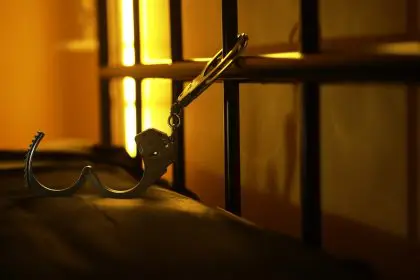Prison life is a world unto itself, with its own set of rules, routines and harsh realities. Among those realities are the low-paying jobs that many inmates are assigned to. These jobs serve various functions — from keeping the prison running to preparing inmates for life outside — but they rarely provide fair compensation for the labor required. Inmates often earn a few cents per hour for their efforts, leaving them with little to no financial support upon release. This article will explore seven common low-paying jobs in prison, shedding light on the challenges inmates face and the emotional toll these jobs take on their lives.
The impact of prison labor on inmates
Before diving into specific jobs, it’s important to recognize the broader context of prison labor. Many inmates work not only to pass the time but also to earn money for basic necessities — such as toiletries, food and phone calls home. Unfortunately, the wages are staggeringly low, sometimes as little as a few cents per hour. The limited compensation highlights a significant issue in the prison system: the exploitation of incarcerated individuals.
1. Laundry worker
Laundry work is one of the most common jobs in prisons across the United States. Inmates are responsible for washing, drying and folding clothes for the entire prison population. This job requires long hours, attention to detail and the physical labor of handling large loads of clothing and bedding. Despite the demanding nature of the work, inmates typically earn pennies on the dollar — sometimes as low as $0.14 per hour. For many, this means working tirelessly just to afford basic commissary items.
Being paid so little for hard work can take a mental toll on inmates. It’s not just about the work itself — it’s about the feeling of being undervalued and exploited, which can further diminish their sense of self-worth during an already difficult time in their lives.
2. Janitorial work
Cleaning the prison — whether it’s sweeping floors, cleaning bathrooms or maintaining the common areas — is another common assignment. Inmates work in shifts to keep the facility clean, which benefits both the prison staff and the inmates themselves. Despite the necessary role they play in maintaining a sanitary environment, janitorial work is often one of the least compensated positions in prison. Inmates typically earn between $0.12 and $0.40 an hour, depending on the state and facility.
The low pay for janitorial work is not just about keeping the facility clean — it’s a constant reminder of the hierarchy within the prison system. While janitors perform essential duties, they are often regarded as being at the bottom of the social and economic ladder, a situation mirrored in the pay structure.
3. Kitchen worker
Working in the prison kitchen is another low-paying yet essential job. Inmates prepare meals, clean dishes and ensure that the kitchen runs smoothly. The work is often fast-paced and physically demanding, with long hours spent on their feet. Despite the importance of feeding the prison population, inmates working in the kitchen often receive very low wages, usually ranging from $0.08 to $0.30 per hour.
Inmates working in the kitchen may feel the emotional conflict of feeding their fellow inmates while knowing that they are barely able to sustain themselves financially. This dynamic adds another layer of frustration to their already difficult experience behind bars.
4. Sewing or garment work
In some prisons, inmates are employed to sew uniforms, repair clothing or create items such as gloves and linens. This work requires precision, patience and skill. However, despite the specialized nature of the job, sewing work is notoriously low-paying. Inmates might earn as little as $0.23 per hour for their efforts, despite contributing to a large-scale operation that often benefits external companies or government contracts.
Many prison jobs — especially those in manufacturing — contribute to outside businesses, yet inmates rarely see the financial benefits of their labor. This raises questions about fairness and economic exploitation within the prison system.
5. Groundskeeping
Maintaining the prison’s outdoor spaces — such as mowing lawns, trimming bushes and tending to gardens — falls under groundskeeping duties. Like other prison jobs, groundskeeping is physically demanding, requiring inmates to work outdoors in all kinds of weather conditions. Yet, despite the effort required, the pay is dismal. Groundskeepers in prison typically earn between $0.10 and $0.25 per hour.
Working long hours outdoors with little pay can feel degrading for inmates. The hard labor, combined with the low wages, serves as a stark reminder of their limited agency while incarcerated.
6. Maintenance worker
Prisons — like any large institution — require regular maintenance to keep the facility in working order. Inmates who work in maintenance are responsible for fixing plumbing issues, repairing electrical systems and addressing structural problems around the prison. While this work requires technical skills and training, inmates are still paid very little — usually between $0.13 and $0.50 per hour, depending on the complexity of the task.
The frustration of performing skilled labor for almost no compensation can weigh heavily on inmates. For those who possess technical expertise, the meager wages feel particularly insulting, as their contributions go unrecognized in any meaningful financial way.
7. License plate production
In many states, prisons house factories where inmates produce license plates. This job requires precision and speed, as quotas must often be met. Despite the technical nature of the work, inmates earn shockingly low wages — usually around $0.16 to $0.50 per hour, depending on the facility. The license plates they produce are then sold to the state, generating revenue that rarely makes its way back to the workers.
The disparity between the hard work inmates put into manufacturing products and the minimal pay they receive can be deeply discouraging. It highlights the broader issue of economic exploitation in the prison labor system.
The need for reform in prison labor wages
The low-paying jobs in prison underscore a broader issue within the justice system: the exploitation of incarcerated individuals for their labor. While these jobs serve important functions within the prison, the wages are far from fair, often leaving inmates struggling to afford basic necessities. For many, the meager earnings exacerbate an already difficult situation, creating feelings of hopelessness and frustration.
As we reflect on the role of prison labor in society, it becomes clear that reforms are necessary. Inmates should be compensated fairly for the work they perform, providing them with a sense of dignity and the financial means to start anew once released. Until changes are made, the harsh reality of low-paying prison jobs will continue to weigh heavily on the lives of incarcerated individuals across the country.
This story was created using AI technology.











